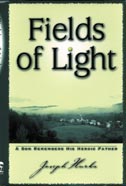| |
Profile
 A
Son's Tribute A
Son's Tribute
Tufts writing instructor journeys to discover his father's
hidden past
In 1989, after years of oppression under a Communist regime, the
newly formed Czech Republic emerged as a free democracy. Four years
later, Joseph Hurka, the son of a Czech emigre, decided to visit
his paternal homeland and write a travel article. But while waiting
in the airport for his flight home, he instead found himself sketching
stories of his father, Josef Hurka, and his Aunt Mira. "Their story
was going to be the focus of my writing," he recalls.
The result is Fields of Light: A Son Remembers
His Heroic Father, the winner of Pushcart's 19th annual Editor's
Book Award. The book, which was nominated for the award by the late
short-story master Andre Dubus, has garnered critical praise from
the Boston Globe to the Prague Post and was called
"a welcome change from other memoirs" by Publishers Weekly.
Part travelogue, part memoir, the book melds Hurka's
trip to Prague with the story of his father's life. While retracing
his father's steps, Hurka was able to draw a portrait of a complicated
man and patriot. "I felt like he had been erased from history,"
Hurka says. "I wanted to write him back in because of my profound
respect and love for him."
In the book, Hurka, who teaches creative writing
at Tufts, gives a concise history of Czechoslovakia, weaving his
family's story into that of the country. Hurka's father witnessed
two of the darkest periods of Czech history: the invasion by the
Nazis and the Communist takeover shortly after the end of the war.
As a boy, Josef Hurka helped other Czechs fight
against the Nazi invaders, smuggling dynamite from Nazi-controlled
mines in one instance. As a young man, he worked with the anti-Communist
underground, escorting important Czech figures out of the country
to safety.
In one of the book's more dramatic sequences,
Hurka's father and a partner are ambushed. His narrow escape through
the streets of Prague with a bullet in his back reads like a scene
from a cold war spy novel. He was later smuggled out of the country
and eventually immigrated to the United States.
 In
another chapter, Hurka visits Pankrac prison where his father was
imprisoned on trumped-up charges and where his grandmother would
visit daily, bringing her son packages that he never received. This,
Hurka says, was the hardest section to write. "There was a grief
and silence inside me," he writes about the visit, "for my grandmother
and my father, and for all the people who had been here." In
another chapter, Hurka visits Pankrac prison where his father was
imprisoned on trumped-up charges and where his grandmother would
visit daily, bringing her son packages that he never received. This,
Hurka says, was the hardest section to write. "There was a grief
and silence inside me," he writes about the visit, "for my grandmother
and my father, and for all the people who had been here."
The trip allowed Hurka to come to grips with his
father's past and to understand more fully what his family had been
through. Emotions ran high on the trip, from anger, remembering
what his father had endured, to affection, feeling an affinity for
the Czech people--"realizing that you actually come from someplace."
Ultimately, the book is the story of a son's love
and respect for his father. Today, when bookstores are often filled
with bitter memoirs that lay blame on parents, Fields of Light
is refreshingly free of parent bashing. "I'm grateful that my parents
brought me up," says Hurka. "I don't have any resentment against
them. And after seeing what my father went through, I'm amazed that
he's here and that he was able to survive."
Of the many people who helped Hurka along the
way with his story, one was his mentor and friend Andre Dubus. Dubus
read two drafts and encouraged his work. "Andre taught me patience,"
Hurka says. "He watched over me as a young writer and taught me
to be thorough and take my time with what I was doing. Fields
of Light took seven years to finish and often, while I was working
on it, I was reminding myself of Andre's insistence that art only
comes from going deep, no matter what the commitment of time."
In the spring, the Czech countryside is ablaze
with repka flowers. These bright yellow flowers appear to glow,
creating "fields of light." These fields, which inspired the title
of the book, reminded Hurka of St. Wenceslas, who legend says will
rise from the fields with his soldiers to help the Czech people
in their time of need. To Hurka, the luminous flowers symbolize
the souls of the people who sacrificed everything for their country's
freedom, his father included.
Josef Hurka, who is retired and lives in Vermont,
is pleased with his son's book. Hurka tried for years to get the
Czech government to recognize his father's heroism. He has, as a
writer, found his own way.
--Michele Gouveia
top
|





